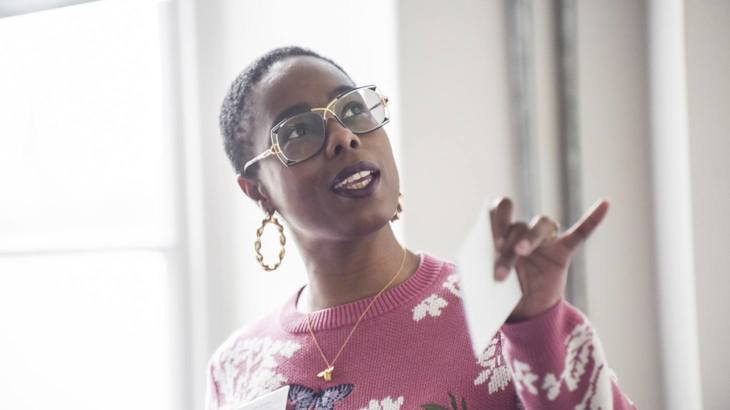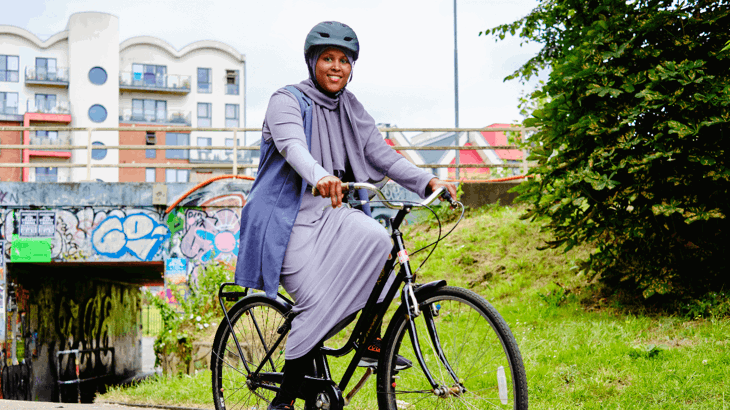Black History Month aims to promote knowledge of the culture and heritage of Black people throughout history and today. It works to build a collective voice and empower people to think critically about historical narratives. In honour of this, we’re celebrating Black leaders whose often overlooked achievements are contributing to a shared vision of a healthier, happier future.

Jools Walker encourages people from all walks of life to try cycling.
There are many who share our vision of making spaces that are safer, healthier, happier and more accessible for everyone.
People from different backgrounds and cultures, whose work has shaped our past, present and future in positive ways.
At Sustrans, we want to work harder to recognise this and to celebrate it more often.
We know we have a long way to go to better represent the communities we work with.
You can read about the action we are taking to address this, as well as how we can actively raise the ambition of the whole sector at the end of this blog.
Celebrating Black History Month
The 2021 Walking and Cycling Index found that only 14% of people from ethnic minority groups cycle once a week (in comparison to 18% of White people).
And only 44% of people from ethnic minority groups walk at least five days a week (in comparison to 51% of White people).
Black History Month has encouraged us to share this blog and acknowledge the often-overlooked contributions of Black people who are making it easier for people everywhere to walk, wheel and cycle.
Here are some inspirational figures and groups, past and present, who we want to celebrate and thank.
Maria Adebowale-Schwarte
Founding Director of Living Space Project
Maria Adebowale-Schwarte is a strategist for public spaces with a focus on the environment and inclusivity.
She is an expert in city design and place making, and the first to receive the Environment Fellowship from the Clore Social Leadership Programme.
The Clore Social Leadership programme develops leaders with a social purpose so that they can transform their communities, organisations and the world around them.
Maria is the founder of the Living Space Project, a social enterprise that helps communities create green neighbourhoods in urban areas.
In 2017, she was appointed by the London Mayor to be a commissioner on the London Sustainable Development Commission.
Her job was to develop ways of improving the quality of life in the city.
Maria is also the author of The Placemaking Factor, a book that looks at how we define place making and the environment.
Through research, interviews and stories, her book observes the human connection to the places we live, love, work and play in.
TedX asked Maria:
“If you could change one thing about the world through your work, what would it be?”
She replied:
“Everyone would have the right to a decent home and access to spaces where they can live, play and love without fear.”
Maria’s work continues to be invaluable for making our towns and cities greener, more inclusive and better places to be.
Elsie Owusu OBE
Architect and Designer
Elsie Owusu is an urban architect and designer.
She is an expert in transport and infrastructure, as well as the issues facing emerging economies.
Elsie believes that architecture and spaces should look like the people it serves.
Elsie was named by RIBA as a role model for her support of inclusivity and diversity, with her work having inclusion and art at its core.
As an example, Elsie redesigned the entrance at historic Green Park station in London, introducing:
- step-free access to all three lines with lifts
- a new ramp from the ticket hall into the park
- artwork.
In 2003, she was awarded the Order of the British Empire (OBE), granted by Queen Elizabeth II, for her services in the field of architecture.
Elsie is the founding chair of the Society of Black Architects which ‘arose out of a need to integrate fully the contribution of ethnic minority professionals as providers and consumers of architectural and design services’ (Society of Black Architects Facebook group).
In her talk for TEDx, Elsie states:
“Today’s architects are not representative of the population in the UK.”
She discusses the importance of equal representation amongst designers and who they are designing for.
Adding that the pipeline for bringing young people, people of colour, women, and working-class students into the profession is fundamentally broken.
Her words ring true for all work that involves designing spaces for people in the UK, whether that’s designing buildings or outdoor spaces and streets.
In our guide for inclusive cycling in cities and towns, we wrote:
‘When people in power and people who govern, design and deliver transport and cycling do not represent the wider population, unconscious and conscious bias can mean decisions, policies and schemes are not designed around the needs of everyone as they are not fully understood or considered.’
Elsie's work looking at who is designing our spaces, and ensuring we are making them safer and more inclusive, is testament to that.
Maurice Burton
First Black British champion in cycling
Maurice Burton is an English cycle shop owner and former racing cyclist.
He was the first Black British champion in cycling, taking first place in the junior sprint race in 1973.
From a young age, he practised at Herne Hill Velodrome in London and by the age of 16, was winning most championships.
At 18, he was selected for the Commonwealth Games.
Maurice faced a lot of racism in the sport at this time.
The height of this racism came to light when he got booed as he won his race at the Commonwealth Games in 1973.
Maurice’s passion and determination is a big inspiration for young people who love to cycle, especially those who are marginalised.
Following his retirement from professional racing, Maurice founded Team De Ver Cycling Club in the 1980s.
The Team De Ver Cycling club website says:
‘Maurice’s vision was to increase the accessibility of the sport to all sections of the community irrespective of race, gender or background, and encourage a wide and diverse group of people into cycling and enjoy the sheer pleasure of riding a bike.
‘Maurice encouraged local men and women of all abilities and from all backgrounds to join his group.
‘The group trained together to gain bike fitness in order to enter various charity rides raising money for a variety of charities.’
Today, Maurice speaks honestly about the racism he experienced at a young age in the UK and how it stifled his career.
In a 2020 interview with Roger Clarke, Sky Sports News, Maurice reflected on the need for more to be done to encourage diversity in what remains a predominantly white sport.
Jools Walker, aka Velo City Girl
Award-winning author, freelance writer, host and public speaker
Jools Walker encourages people from all walks of life to try cycling.
She explores and showcases the many different forms of cycling and believes “there is something for everyone”.
Jools is inspirational, take a read of this excerpt from her website biography:
‘My debut non-fiction book, Back in the Frame (How to get back on your bike, whatever life throws at you) was published by Little Brown UK in May 2019.
‘In October 2019, Back in the Frame was ranked number five in Book Authority’s 100 Best Cycling Books of All Time awards list.
‘Leading UK publication BikeBiz named me as one of the most influential women in the UK cycling industry.
‘I’ve spoken about cycling culture on platforms as varied as BBC Newsnight, the Design Museum, BBC Radio 4, BBC Radio 6, Southbank Centre’s WOW Festival, Wilderness and at various literary festivals around the UK.’
Jools supported our Cycling for everyone report in partnership with ARUP, which set out recommendations for the transport industry to help tackle inequalities in cycling in urban areas.
In her foreword she wrote:
‘Witnessing some improvements occurring in planning better infrastructure and accessibility in cycling has been encouraging, but at this point, it’s still not enough.
‘It’s not enough when those who have the power are not factoring in the needs and concerns of marginalised groups and those who don’t cycle.
‘It’s not enough when these groups aren’t reflected by those who sit on these decision-making boards.’

There are a number of groups in the UK who are working hard to make cycling easier and more representative. Credit: PhotojB
Cycling groups which aim to increase diversity
There are a number of groups in the UK who are working hard to make cycling easier and more representative.
A UK-wide cycling club that aims to share their love of cycling with brothers from all faiths and beliefs.
An award-winning organisation which inspires and enables Muslim women to cycle.
They work to address the inequalities in cycling by ensuring that the needs of Muslim women are understood and met.
Women of Colour Cycling Collective
A friendly, supportive space for any woman of colour who rides a bike or is thinking about riding a bike.
The group includes roadies, leisure riders and newbies, and is inclusive of trans women, non-binary people and people from multi-ethnic backgrounds.
What are we doing?
Cities and towns should be places that prioritise the people who live and spend time there.
For too long they have been designed around cars, leaving less space for walking, cycling and spending time in.
Car-dominated spaces create congestion and damage our environment and health.
They harm people who are already disadvantaged the most.
Our cities and towns can and should be designed with everyone’s health and wellbeing in mind, rather than cars.
At Sustrans, we create places that connect us to each other and what we need.
Places where everyone can thrive without having to use a car.
Sociable places where friends and facilities are a short walk away, and it’s easy and pleasant to travel beyond our neighbourhood.
Places with clean air and green spaces, where everyone has the choice to walk, cycle, scoot or wheel safely to school, work and around their local area.
These are communities in which friendships are made and people belong.
We don’t work alone to create liveable towns and cities.
We bring together the people who live and spend time there, including those with seldom-heard voices, to make the change they want to see.
Our 'For everyone' strategy aims to strengthen diversity and inclusion across the charity and throughout our work.
This includes actively collaborating with an increasing variety of people, during every stage of the projects we deliver.
We're also working with communities to improve accessibility and reduce the barriers to walking, wheeling and cycling.
But it is clear that we can do much more.
What can the transport sector do?
In 2020, we teamed up with our friends at ARUP to create the Cycling for everyone guide.
And in 2022, we reunited, this time with Living Streets joining us, to create the Walking for everyone guide.
These guides outline recommendations for how local and national governments can make walking, wheeling and cycling more inclusive, and help address inequity in society.
The guides also support the work of transport and spatial planning professionals, organisations helping to improve the lives of people who may be marginalised, and anyone helping to make active travel more inclusive.
Download the Cycling for everyone guide and the Walking for everyone guide.
Read about Steppin Sistas, the Bristol walking group for women of colour.





